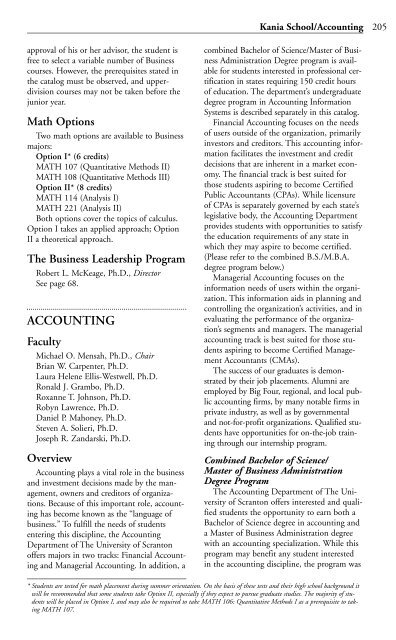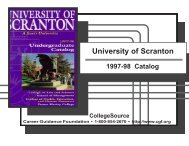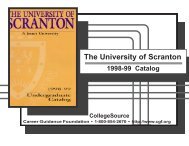2003-2004 - The University of Scranton
2003-2004 - The University of Scranton
2003-2004 - The University of Scranton
Create successful ePaper yourself
Turn your PDF publications into a flip-book with our unique Google optimized e-Paper software.
approval <strong>of</strong> his or her advisor, the student is<br />
free to select a variable number <strong>of</strong> Business<br />
courses. However, the prerequisites stated in<br />
the catalog must be observed, and upperdivision<br />
courses may not be taken before the<br />
junior year.<br />
Math Options<br />
Two math options are available to Business<br />
majors:<br />
Option I* (6 credits)<br />
MATH 107 (Quantitative Methods II)<br />
MATH 108 (Quantitative Methods III)<br />
Option II* (8 credits)<br />
MATH 114 (Analysis I)<br />
MATH 221 (Analysis II)<br />
Both options cover the topics <strong>of</strong> calculus.<br />
Option I takes an applied approach; Option<br />
II a theoretical approach.<br />
<strong>The</strong> Business Leadership Program<br />
Robert L. McKeage, Ph.D., Director<br />
See page 68.<br />
ACCOUNTING<br />
Faculty<br />
Michael O. Mensah, Ph.D., Chair<br />
Brian W. Carpenter, Ph.D.<br />
Laura Helene Ellis-Westwell, Ph.D.<br />
Ronald J. Grambo, Ph.D.<br />
Roxanne T. Johnson, Ph.D.<br />
Robyn Lawrence, Ph.D.<br />
Daniel P. Mahoney, Ph.D.<br />
Steven A. Solieri, Ph.D.<br />
Joseph R. Zandarski, Ph.D.<br />
Overview<br />
Accounting plays a vital role in the business<br />
and investment decisions made by the management,<br />
owners and creditors <strong>of</strong> organizations.<br />
Because <strong>of</strong> this important role, accounting<br />
has become known as the “language <strong>of</strong><br />
business.” To fulfill the needs <strong>of</strong> students<br />
entering this discipline, the Accounting<br />
Department <strong>of</strong> <strong>The</strong> <strong>University</strong> <strong>of</strong> <strong>Scranton</strong><br />
<strong>of</strong>fers majors in two tracks: Financial Accounting<br />
and Managerial Accounting. In addition, a<br />
Kania School/Accounting 205<br />
combined Bachelor <strong>of</strong> Science/Master <strong>of</strong> Business<br />
Administration Degree program is available<br />
for students interested in pr<strong>of</strong>essional certification<br />
in states requiring 150 credit hours<br />
<strong>of</strong> education. <strong>The</strong> department’s undergraduate<br />
degree program in Accounting Information<br />
Systems is described separately in this catalog.<br />
Financial Accounting focuses on the needs<br />
<strong>of</strong> users outside <strong>of</strong> the organization, primarily<br />
investors and creditors. This accounting information<br />
facilitates the investment and credit<br />
decisions that are inherent in a market economy.<br />
<strong>The</strong> financial track is best suited for<br />
those students aspiring to become Certified<br />
Public Accountants (CPAs). While licensure<br />
<strong>of</strong> CPAs is separately governed by each state’s<br />
legislative body, the Accounting Department<br />
provides students with opportunities to satisfy<br />
the education requirements <strong>of</strong> any state in<br />
which they may aspire to become certified.<br />
(Please refer to the combined B.S./M.B.A.<br />
degree program below.)<br />
Managerial Accounting focuses on the<br />
information needs <strong>of</strong> users within the organization.<br />
This information aids in planning and<br />
controlling the organization’s activities, and in<br />
evaluating the performance <strong>of</strong> the organization’s<br />
segments and managers. <strong>The</strong> managerial<br />
accounting track is best suited for those students<br />
aspiring to become Certified Management<br />
Accountants (CMAs).<br />
<strong>The</strong> success <strong>of</strong> our graduates is demonstrated<br />
by their job placements. Alumni are<br />
employed by Big Four, regional, and local public<br />
accounting firms, by many notable firms in<br />
private industry, as well as by governmental<br />
and not-for-pr<strong>of</strong>it organizations. Qualified students<br />
have opportunities for on-the-job training<br />
through our internship program.<br />
Combined Bachelor <strong>of</strong> Science/<br />
Master <strong>of</strong> Business Administration<br />
Degree Program<br />
<strong>The</strong> Accounting Department <strong>of</strong> <strong>The</strong> <strong>University</strong><br />
<strong>of</strong> <strong>Scranton</strong> <strong>of</strong>fers interested and qualified<br />
students the opportunity to earn both a<br />
Bachelor <strong>of</strong> Science degree in accounting and<br />
a Master <strong>of</strong> Business Administration degree<br />
with an accounting specialization. While this<br />
program may benefit any student interested<br />
in the accounting discipline, the program was<br />
* Students are tested for math placement during summer orientation. On the basis <strong>of</strong> these tests and their high school background it<br />
will be recommended that some students take Option II, especially if they expect to pursue graduate studies. <strong>The</strong> majority <strong>of</strong> students<br />
will be placed in Option I, and may also be required to take MATH 106: Quantitative Methods I as a prerequisite to taking<br />
MATH 107.
















